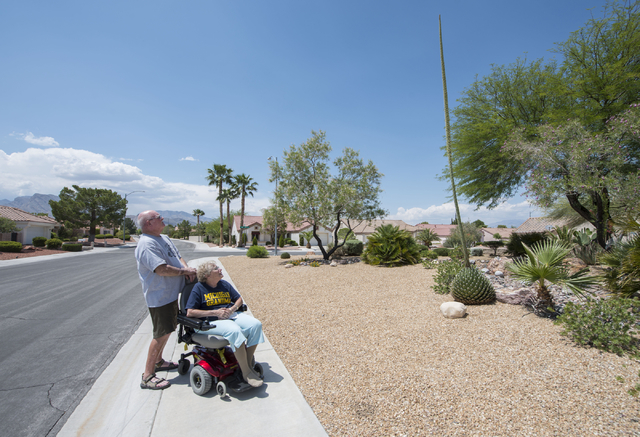Spectacle of agave plant’s bloom a new source of joy in woman’s life

Her smile — you wonder if somehow it will grow as wide as her Queen Victoria agave plant has grown tall.
As Lanne Tuohy tilts her head back in her wheelchair to see how high her queen has grown in the last 24 hours, a cloudy day seems to become as bright as her smile.
“Can you believe it?” she giggles as she sits in her front yard. She’s 69 with gray hair, a grandmother, but she has a giggle of a little girl in elementary school. “This plant did nothing for 17 years and now it’s sent up a flowering stalk 20 feet tall. Isn’t it great?”
Infectious. That’s how UNLV biology professor Paul Schulte describes her enthusiasm for the work Mother Nature has done with her queen. Ditto for Brandi Eide and Brenda Rodriguez, who work with the gardens at the Springs Preserve.
Tuohy got their names and emails and phone numbers from websites or telephone operators and then began sending them pictures and peppering them with questions.
“She was so excited I couldn’t help but be excited,” says Schulte, who made a trip out to Tuohy’s Sun City Summerlin home to view the Queen Victoria.
Eide and Rodriguez began sharing her emailed photos with Springs Preserve staff. “It grows on you when someone is so tickled pink,” Rodriguez says.
Yes, it appears Tuohy has kissed the sunshine. But if someone with her background always seemed enveloped by darkness, with a self-pitying mind that could find no peace, few people would be surprised.
The professor and Springs Preserve staffers didn’t know she had a disability until I told them.
In the late 1970s, she began to have weakness and tingling in her muscles, balance problems. At first, doctors blamed it on her tennis addiction. How she loved the game. She could play it in the early morning sun and under the lights. But then she lost sight in one of her eyes.
A diagnosis of multiple sclerosis, a disease with no cure, followed. Her body’s immune system was eating away at the protective sheath covering her nerves, a process interfering with the communication between her brain and body. Doctors told her that people with severe cases can lose the ability to walk and talk.
She didn’t want to hear it. She volunteered with hospice families, sang in musical groups, led a Bible study in church. When she could no longer play tennis, she took up golf and continued swimming laps.
In 1998, about the time she moved to Las Vegas from Michigan, golf became too much for her. Her loving husband, Mike, would help her get around, jokingly calling her “Ilean,” as in “I lean right” and “I lean left.” Walkers and then scooters followed when the disease progressed and new drugs didn’t help her.
Last year, she had to start using a wheelchair, an experience that she says has been particularly difficult. She says her husband, a retired school principal, still makes sure they go to movies, the theater, and out to eat. The only thing he won’t do, she says, is join her when she wants to have a pity party.
“It’s not easy being in a wheelchair,” she says. “But I’m handling it the best I can.”
She even had to stop going to some of her bridge games, but she found a way to play online. Now she has bridge partners all over the globe.
When she noticed her Queen Victoria starting to bloom last month, she took to the Internet to read about it and then began calling UNLV and Springs Preserve.
“I had never been into gardening before but it just amazed me, tickled me,” she says. “I didn’t know nature could make me feel that way.”
She started talking with neighbors about what was happening.
“They all know now it takes up to 20 years for it to look like this and then it’s going to die pretty soon,” she says. “If I’m lucky though, when it turns brown and goes down, it’ll drop some seed for new plants.”
Terry Winger, who lives across the street, swears he can stare at the plant and see it growing.
The experience with her Queen Victoria, Tuohy says, has helped her find yet another way to enjoy life.
She says when you have a mountain in your way when you’re trying to find joy, you have to be open to finding an alternate route.
Paul Harasim’s column runs Sunday, Tuesday and Friday in the Nevada section and Thursday in the Life section. Contact him at pharasim@reviewjournal.com or 702-387-5273. Follow @paulharasim on Twitter.